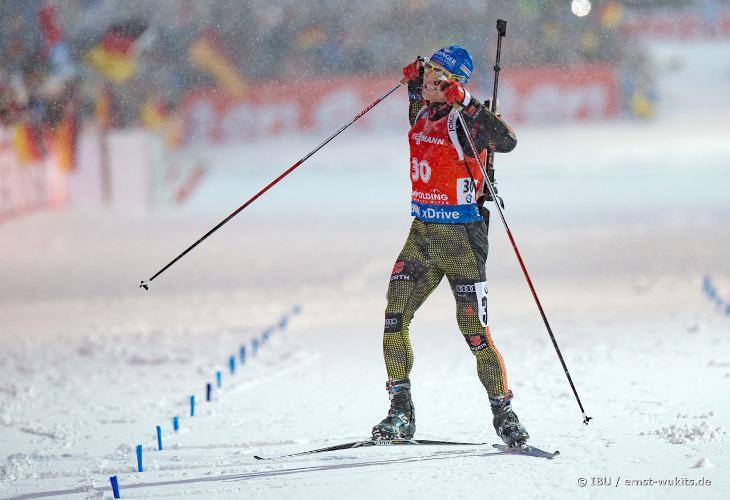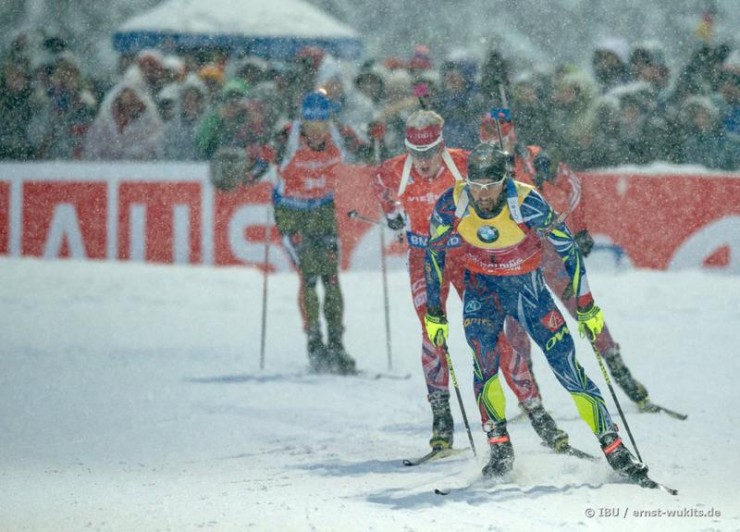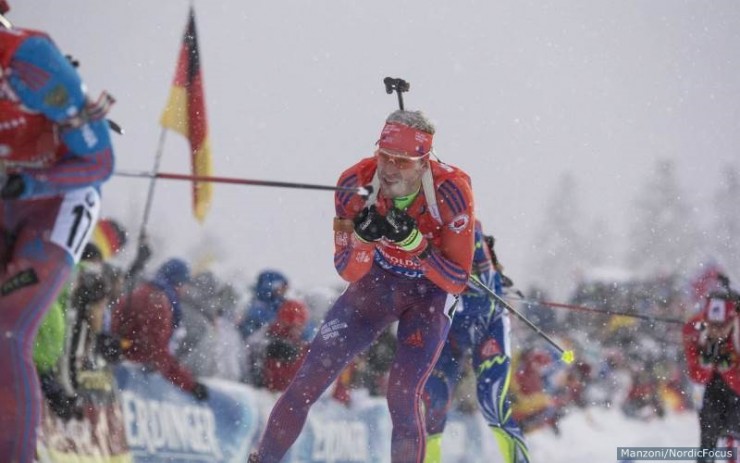
In recent weeks, Germany’s Erik Lesser had become annoyed with questions on a single topic: whether he was concerned about not having fulfilled the “World Championships norm” yet.
German biathletes are required to post at least one top eight or two top 15’s in an IBU World Cup within a season to qualify for major championships. And Lesser, a gold medalist in the pursuit and relay at 2015 World Championships in Kontiolahti, Finland, was the only senior team member — male or female — who had yet to achieve that mark ahead of 2016 World Championships.
On Saturday evening, in front of a home crowd of more than 20,000 spectators in the biathlon arena and around the course in Ruhpolding, Germany, Lesser put all doubts to rest, winning the men’s 15-kilometer mass start in 40:29.3 minutes with perfect 20-for-20 shooting. Despite heavy snowfall, Lesser cleaned all four shooting stages, and on the final loop, he held his own ahead of France’s World Cup leader Martin Fourcade, beating him by 9.8 seconds.
Fourcade had a single penalty on the last stage to place second, and Russia’s Evgeniy Garanichev missed one on the last shooting to finished third (+13.1). Fourcade and Garanichev had come into the final stage just ahead of Lesser, but then had to complete the 150-meter penalty lap after each missing a target.
The two North Americans in the mass start, Canada’s Nathan Smith placed 15th (+1:20.8) and American Lowell Bailey finished 21st (+2:08.4), both with one penalty.
After the race, Lesser was highly satisfied, and claimed he never had any doubt about his ability to qualify for the upcoming IBU World Championships in Oslo, Norway.
“Now you have to shut up about that, huh. Now I don’t want to hear about that again after giving you what you wanted,” Lesser said with dry wit when he got interviewed by German TV broadcaster ZDF. “I couldn’t care less about the norm. I knew I had that in me; I just couldn’t put it together. Today thankfully everything worked out.”
Questioned again if his coaches were also as convinced, and whether he had been anxious to achieve that kind of result, Lesser added:
“Yeah, the next time I’m waiting for my World Championships norm, I’m taking you guys with me into the [athletes’] container, then you can watch us while you analyze our races, and there really was everything but a bad mood after my races. Everything was good, also between the coaches and me. Everyone was understanding,” he said.
Outside the top 25 in the overall World Cup standing, Lesser had to qualify for the mass start as one of five additional athletes with the best performances of the race week. He narrowly managed to do that by placing 17th in the 20 k individual competition on Wednesday, earning the final start in bib 30.
Since he thus had to start at the back of the field in the mass start, Lesser decided to set out at a steady pace allowing a little gap to form, in order to avoid what he called the “accordion effect” of constantly having to slow down and accelerate again as the field bunches up before climbs and then extends again like pearls on a string.
“The bib number at the start really doesn’t matter. But I always heard the public announcer in the arena bellowing, ‘Oh Erik Lesser runs behind the field on the first loop.’ But it was planned exactly like that,” Lesser told ZDF. “I could ski behind others for four loops, and then only had to lead on the last one; that suits me well. The [wax] technicians really put together great equipment again, like the whole time here in Ruhpolding, and that makes it a little easier.”
In the first prone shooting, 16 starters shot clean, including all of the eventual podium finishers, and US Biathlon’s Bailey. That put Smith, of Biathlon Canada, who had missed one target, at an early disadvantage, leaving the penalty lap and range in 23rd place and about 30 seconds behind the leaders.
“Since my miss came in the first prone, I ended up a little back heading out onto the second loop,” Smith explained in a Biathlon Canada press release. “With the next three cleans, I moved up a little each time, but the field as a whole was shooting so well today, it was tough to make any big moves.”
“I was aiming for a top 10 finish and knew that would take [hitting] 18 or 19 [targets] with strong skiing,” Smith wrote in an email to FasterSkier. “13 of the top 30 athletes shot 19 or better, even with snowy conditions. That’s some cut throat competition!”
After the second prone, a large group still remained in contention. However, this stage did set back a few favorites, such as Norway’s Tarjei Bø, who had entered the range in first and left in 20th after two misses. He would eventually finish in 11th (+1:07) with three penalties.

On the third 3 k loop, Fourcade, Norway’s Johannes Thingnes Bø and Garanichev emerged as the top three, with five athletes not far behind them: Lesser, Russia’s Maxim Tsvetkov, Norway’s Emil Hegle Svendsen, as well as the Czech Republic’s Ondrej Moravec and Michal Krcmar.
At this point, slugging through the heavy snowfall was visibly hard, and several athletes took feeds to keep up their energy.
Lesser was able to separate himself from that chase group, slowly closing the gap. “Super equipment, super speed,” one of his coaches yelled from the side of the course.
Before the third shooting stage, Lesser had closed the gap, and while Johannes Thingnes Bø missed two of his targets to fall out of contention (he ended up 12th with three penalties), the other three leaders stayed clean, leaving the range together again, all within two seconds.
On the penultimate loop, Fourcade tried to force an early decision, jumping up the longest climb with great speed, and created a gap of a few seconds to Lesser. Garanichev followed in Lesser’s draft, and Moravec trailed the group by about 25 seconds in fourth.
“Martin did a really good fourth lap, and I had some problems in the uphills,” Lesser said during the post-race press conference.
In the final shooting, Lesser entered the range in third, but shot clean while his two opponents each missed their first and only target of the day.
Lesser headed out on the final loop just 12.3 seconds ahead of Fourcade with Garanichev 0.6 seconds behind as the two stormed out of the penalty lap eager to catch the German. On the first long climb it looked like his lead was starting to shrink, but at the next timing point, Fourcade was 12.6 seconds behind in second.
Then Garanichev started his final attack and overtook Fourcade, but was not able to create a significant gap, coming through the next split still 10.9 seconds behind Lesser.
“Nine seconds ahead, go Erik, go!” cheered a German assistant coach while running next to him on the side of the track.
The last loop took Lesser a little longer than most of his previous times around the track, but he was able to stay ahead over a flat section and downhill leading into the arena, finally coming into the finish with the welcoming roar from the sold-out arena, while Fourcade managed to take second back from Garanichev in the final sprint.
Asked to describe his feelings on the final loop, Lesser said at the press conference: “From happy, to exhausted, to really happy.”
“The relay yesterday was hard for me, I was really exhausted after the race” Lesser added in a video interview with the IBU’s Jerry Kokesh. “But I’m really happy that I had the right power for today’s last lap. After all the sh*tty races this season, yup, really happy to be on the podium again.”
“I did the grooming machine all the competition,” Fourcade said at the press conference of skiing at the front of the pack. “So I felt a bit exhausted on the last lap. In the beginning I thought I could catch Erik, but then I also wanted to keep my second place … So I focused on the Evgeniy fight, and am happy about my second place today.”
“I am really happy about my two weeks in Ruhpolding. I created a good gap for the overall ranking and am really satisfied, that was my main goal for January,” he added. “I must say that when I see the crowd today, and the atmosphere, it was something crazy, so I am a bit sad to move because it was better every day. Great competitions, great organization, and I think all the athletes really enjoyed their stay these two weeks.”
“Starting from the first stage in the World Cup season [in Östersund, Sweden] I have been good in speed, and just performing on the same high level,” Garanichev said at the press conference through a translator. “I am glad to be on the podium again, but I have to be careful about saying this is my best race so far because it was a really tough race, the sixth in ten days. So I would say it was a good race,”
“Martin is not the type of guy who will easily let someone go,” he said of passing Fourcade on the final loop, not really expecting to create a gap. “So I just focused on fighting with Erik, and tried to do my best.”
With a significant distance to the three podium finishers, Garanichev’s teammate Anton Shipulin placed fourth (+42.5) with one penalty, Krcmar was fifth for the best World Cup result of his career so far (+47.2 with one penalty), and Germany’s Simon Schempp finished sixth (+48.0, two penalties).
This was Schempp’s first race this year after returning from the lengthy aftereffects of a respiratory infection, which caused him to drop from third in the World Cup standings (after the races in Pokljuka, Slovenia, just before the holiday break) to seventh.
“I was really satisfied with my race,” Schempp told the IBU. “I was not so aggressive in the beginning, but I feel okay, and happy with sixth place…. It’s so much fun, especially because I’m at home here, training the whole year in this stadium. Really happy to see so many spectators, and the atmosphere is great.”

“It’s always a great atmosphere here in Ruhpolding. I love the German fans!” Bailey wrote in an email.
Sweden’s Torstein Stenersen was the only athlete in the field besides Lesser who cleaned all four stage, but skied considerably slower to finish 20th (+1.54.4).
Smith skied the 23rd-best overall course time in the difficult conditions, but was able to move up a bit on each loop thanks to three clean stages after his early miss (1+0+0+0) to place 15th.
“The ski course was extremely slow going with the fresh snow falling. The 15 kilometre time was close to what the winning time was for the 20 kilometre individual race,” Smith told Biathlon Canada. “I had been feeling kind of fatigued the last few races, but I am happy that I was able to overcome that by performing well on the shooting range and end up with a very respectful final result.”
Bailey cleaned three out of four stages, missing one on his first standing (0+0+1+0) for 21st.
“I had the goal of staying with my shooting focus and not getting distracted by the excitement of the competition,” Bailey wrote. “I accomplished this, and overall I’m happy with the way shooting is going at the moment.”
Asked if his solid shooting throughout back-to-back World Cup weeks in Ruhpolding was a result of the range (which most athletes generally considered to be easy due to the downhill approach and good wind protection, though in heavy snowfall, that might be drastically different) or any newfound adjustments, he wrote:
“You work your whole career on the small little details that comprise a solid shooting approach, but at the end of the day, sticking to simple key cues has been what I’ve been using throughout the season. The fundamentals have to be developed, but then the key is getting your mind and body in a place where they can execute the things you’ve trained to do.”
After posting the 20th-fastest time on the first loop out of the start, Bailey’s skiing became a bit slower on the subsequent rounds, and he ended the day with the 28th course time.
“It was one of the more challenging races of my career. I just felt tired from the start,” Bailey wrote. “We’ve had six races in the last eight days, most of which occurred in slow conditions … I just think I reached my limit and didn’t quite have the energy required to ski with the best today”.
Bailey and Smith were certainly not alone feeling their energy run low after a hard block of races. Norwegian biathlon legend Ole Einar Bjørndalen finished last in 30th (+5:42.6), with 10 penalties and the third-slowest course time.
After two weeks in Ruhpolding, the World Cup tour now moves to Antholz-Anterselva, Italy, with sprints on Thursday and Friday, followed by pursuits on Saturday, and another relay on Sunday.
“Antholz is always really good competitions, good snow, good for fights, and most of all the weather is often good,” Fourcade said. “I am also really happy to move to Antholz, and to have some Italian food, too, that’s something I like.”
Harald Zimmer
Harald has been following cross-country skiing and biathlon for some 20 years since the Olympic Winter Games in Albertville and Lillehammer. A graduate of Middlesex University London and Harvard University, he now lives near the Alps where he likes to go skiing, snowboarding and hiking. He is a former track athlete in middle-distance running, as well as a huge NBA fan.



